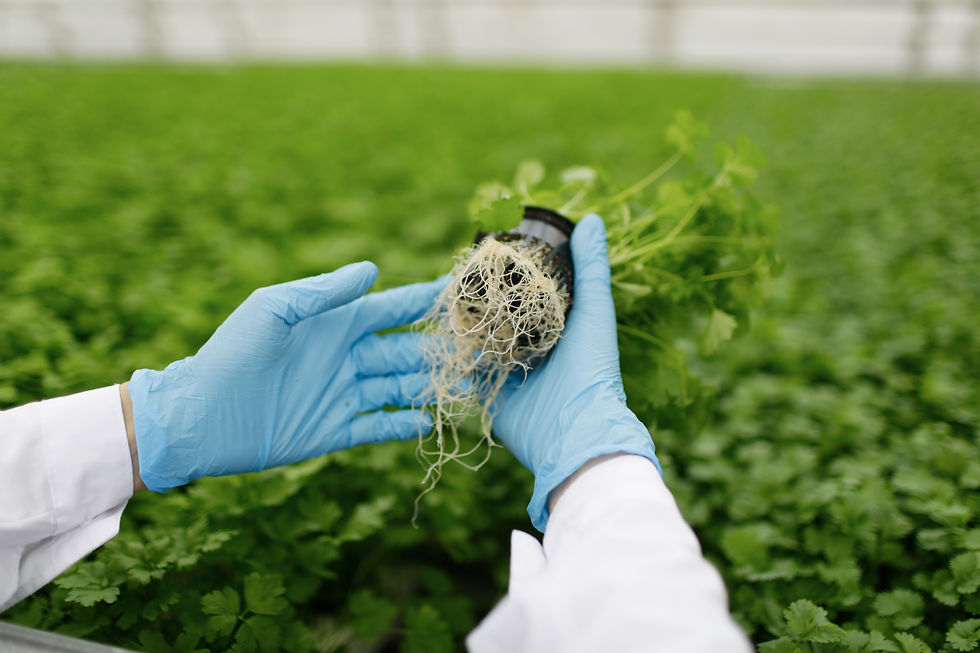Advantages of Bacillus Mucilaginosus Fertilizer
- universalmicrobesu
- Jul 16, 2024
- 3 min read

In recent years, Bacillus Mucilaginosus has gained significant attention as a potent fertilizer due to its unique properties and benefits for crop health and soil fertility. This article explores in depth the advantages of Bacillus Mucilaginosus fertilizer, explaining its mechanisms, applications, and advantages in agricultural practices.
Bacillus Mucilaginosus, a beneficial bacterium found in the soil, plays a crucial role in enhancing plant growth and soil health. Its ability to promote nutrient uptake, suppress pathogens, and improve soil structure makes it a valuable addition to modern agricultural practices. This article delves into its specific advantages, detailing how farmers and agriculturalists can harness its potential to achieve sustainable and productive crop cultivation.
1.Enhanced Nutrient Availability
One of the primary advantages of Bacillus Mucilaginosus fertilizer is its role in enhancing nutrient availability in the soil. This bacterium secretes enzymes that solubilize essential nutrients like phosphorus, potassium, and micronutrients, making them more accessible to plants. By facilitating nutrient uptake, Bacillus Mucilaginosus helps improve plant growth, vigor, and overall crop yield.
2. Improved Soil Structure and Aeration
Another significant benefit lies in Bacillus Mucilaginosus' ability to improve soil structure. It produces extracellular polymeric substances (EPS) that bind soil particles together, enhancing soil aggregation and stability. This results in better soil aeration and water infiltration, crucial for root development and nutrient absorption by plants. Improved soil structure also reduces soil erosion and compaction, promoting long-term soil health and sustainability.
3. Biocontrol and Disease Suppression
Bacillus Mucilaginosus acts as a biocontrol agent against various soil-borne pathogens and pests. It produces antimicrobial compounds that inhibit the growth of harmful organisms like fungi and nematodes. By suppressing these pathogens, the bacterium helps protect plant roots from diseases such as root rot and damping-off, reducing the need for chemical pesticides and fostering a healthier soil ecosystem.
4. Enhanced Plant Growth Promotion
Through mechanisms like phytohormone production and nitrogen fixation, Bacillus Mucilaginosus promotes robust plant growth. It synthesizes plant growth-promoting substances such as indole acetic acid (IAA) and gibberellins, which stimulate root development, flowering, and fruiting in crops. Additionally, its ability to fix atmospheric nitrogen provides plants with a supplementary source of this essential nutrient, particularly beneficial in nitrogen-deficient soils.
5. Environmental Sustainability
The use of Bacillus Mucilaginosus fertilizer aligns with sustainable agricultural practices. By reducing reliance on synthetic fertilizers and pesticides, it minimizes environmental pollution and preserves soil biodiversity. The bacterium's eco-friendly nature and biodegradability make it a preferred choice for organic farming systems, contributing to healthier ecosystems and sustainable food production.
6. Adaptability and Versatility
Bacillus Mucilaginosus exhibits versatility in diverse agro-climatic conditions and crop types. It thrives in a wide range of soils and climates, from tropical to temperate regions, making it suitable for various agricultural settings worldwide. Farmers can integrate Bacillus Mucilaginosus into their crop management practices across different seasons and cropping systems, enhancing resilience and productivity.
7. Cost-Effectiveness and Long-Term Benefits
In addition to its agronomic advantages, Bacillus Mucilaginosus offers cost-effective solutions for farmers. By improving nutrient use efficiency and reducing input costs associated with fertilizers and pesticides, it provides long-term economic benefits. Increased crop yields and quality contribute to higher profitability and sustainability in agriculture, making Bacillus Mucilaginosus a valuable investment for farmers seeking to optimize their production systems.
Conclusion
In conclusion, Bacillus Mucilaginosus fertilizer stands out as a sustainable and effective solution for enhancing crop productivity, soil health, and environmental stewardship. Its multifaceted benefits, including nutrient solubilization, disease suppression, and plant growth promotion, make it an invaluable tool in modern agriculture. By harnessing the power of this beneficial bacterium, farmers can achieve resilient and sustainable farming practices while ensuring food security and environmental sustainability for future generations.




Comments